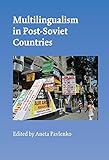Multilingualism in Post-Soviet Countries / ed. by Aneta Pavlenko.
Material type: TextPublisher: Bristol ; Blue Ridge Summit : Multilingual Matters, [2008]Copyright date: ©2008Description: 1 online resource (256 p.)Content type:
TextPublisher: Bristol ; Blue Ridge Summit : Multilingual Matters, [2008]Copyright date: ©2008Description: 1 online resource (256 p.)Content type: - 9781847690876
- 9781847690883
- P40.85.F6 M85 2008
- online - DeGruyter
| Item type | Current library | Call number | URL | Status | Notes | Barcode | |
|---|---|---|---|---|---|---|---|
 eBook
eBook
|
Biblioteca "Angelicum" Pont. Univ. S.Tommaso d'Aquino Nuvola online | online - DeGruyter (Browse shelf(Opens below)) | Online access | Not for loan (Accesso limitato) | Accesso per gli utenti autorizzati / Access for authorized users | (dgr)9781847690883 |
Frontmatter -- Contents -- Multilingualism in Post-Soviet Countries: Language Revival, Language Removal, and Sociolinguistic Theory -- Language Management and Language Problems in Belarus: Education and Beyond -- A Tense and Shifting Balance: Bilingualism and Education in Ukraine -- Uneasy Compromise: Language and Education in Moldova -- Language and Education Orientations in Lithuania: A Cross-Baltic Perspective Post-EU Accession -- Estonianization Efforts Post-Independence -- Language Policies of Kazakhization and Their Influence on Language Attitudes and Use -- Multilingualism, Russian Language and Education in Kyrgyzstan -- Language and Education Policies in Tajikistan
restricted access online access with authorization star
http://purl.org/coar/access_right/c_16ec
The dissolution of the USSR has created conditions for a unique sociolinguistic experiment, in which fourteen countries, previously united by the same language and political system, engaged in a nation-building process, creating new linguistic regimes. Two decades later, how did these countries fare in their struggle to initiate a shift from Russian to the titular languages? Which ones succeeded and which ones restored Russian as an official language? How did they go about articulating the rights of linguistic minorities? Did Russian give way to the new lingua franca, English? This collection offers answers to these and many other questions through detailed analyses of language and education policies and practices in post-Soviet countries.
Mode of access: Internet via World Wide Web.
In English.
Description based on online resource; title from PDF title page (publisher's Web site, viewed 01. Dez 2022)


